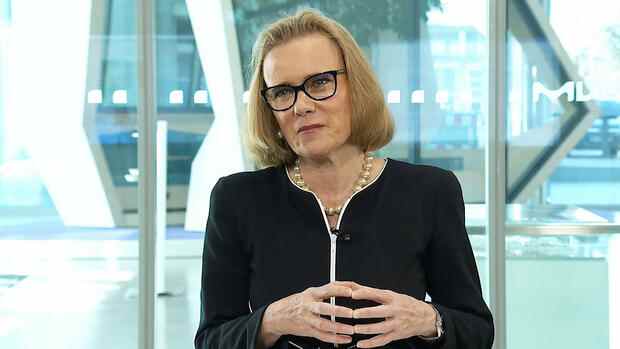Darmstadt Belén Garijo wants to make the Darmstadt-based Dax group Merck more resilient to crises. For the markets, their resilience plans are good news. Because despite the uncertainty in the economic environment, the CEO, who has been in office since May 2021, is sticking to the medium-term goals issued in autumn 2021.
By 2025, Merck wants to grow by an average of six percent annually – without acquisitions – and then generate sales of 25 billion euros. At this year’s Capital Markets Day, she was confident that Merck can achieve its goals even under difficult circumstances.
The 62-year-old Spaniard Garijo was also daring: From next year she wants to make major acquisitions for the company again. She put the financial strength for this at 15 to 20 billion euros: “I am convinced that we will continue to drive our efficient growth, both organically and inorganically,” she said.
The group recently posted sales of 19.7 billion euros and benefits from being active in three business areas: pharmaceuticals, biotech materials and electronic chemicals. Two of them, pharmaceuticals and biotech materials, are considered to be relatively independent of the economy.
Top jobs of the day
Find the best jobs now and
be notified by email.
Garijo’s predecessors Karl-Ludwig Kley and Stefan Oschmann shaped this line-up – also through acquisitions worth billions. With the takeovers of Millipore and later Sigma-Aldrich, Merck established itself as a leader in the growth market of life science, i.e. materials for drug production and laboratories.
With the acquisitions in the chemical business, such as AZ Electronics and most recently Versum Materials for EUR 5.8 billion in 2019, Merck has positioned itself strongly in the semiconductor materials business, which is also a growth market.
Merck boss relies on pharmaceutical, biotech and semiconductor products
But Garijo, a strategically thinking and assertive physician, has further developed the strategy in her eighteen months as CEO. The focus is now on three promising growth areas, the “Big 3”:
- New pharmaceutical products such as the cancer drug Bavencio and the drug Mavenclad against multiple sclerosis
- Semiconductor products (Semiconductor Solutions division)
- Materials and services to manufacture drugs and vaccines (Process Solutions and Life Science Services Division)
These three areas are expected to contribute around 80 percent of the forecast growth over the next few years – not including acquisitions. By 2025, according to the plan, the “Big 3” should then generate around half of Merck’s sales.
>> Read here: These ten German stocks should offer security – our check shows which ones really succeed
The planned acquisitions are also to be primarily located in this area in the future, although type and scope are always a question of opportunities, as Garijo emphasized. The Merck boss explained that the sum could be invested in several acquisitions.
Listen to our podcast “Rethink Work” with brain surgeon Peter Vajkoczy here
At the top of her wish list is the expansion of contract manufacturing of biotech products, which Merck calls “Life Science Services”. Many players are currently investing heavily in this market because they expect great growth from it. Among other things, the Dax group Fresenius has bought here, but technology groups such as Fuji Film and Samsung have also spent billions here.
Because the increasing number of biotechnologically manufactured products and more specific treatments such as gene and cell therapies require new production capacities. At Merck, the “Life Science Services” business unit grew by 24.6 percent in the second quarter and now accounts for around ten percent of the sales of the largest company division, Life Science. At the beginning of 2022, Merck had strengthened itself in this area with the purchase of the US company Exelead for around 780 million dollars.
Merck is prepared for inflation, interest rates and the gas emergency
Despite all the positive news, there are enough challenges for Merck. However, many of these have already been taken into account: Merck CFO Marcus Kuhnert emphasized that rising inflation and rising interest rates have been taken into account in future scope for acquisitions.
By 2025, Merck intends to increase sales to EUR 25 billion.
(Photo: dpa)
Merck has also made provisions for a possible gas emergency and can largely switch production to oil. In addition, the group wants to further regionalize its production in order to become less dependent on global supply chain risks.
>> Read here: The pharmaceutical industry sees the supply of innovative medicines at risk
During the corona pandemic, Merck benefited greatly from high demand from vaccine researchers and manufacturers. In 2022, the company still expects pandemic-related special sales of up to 800 million euros. “Basically, however, the Covid effects are decreasing as expected,” said Garijo. Only half is expected for the coming year.
The plan is that the increasing sales in the life science division can then offset that. For this year, Garijo is sticking to the forecast: organic sales are expected to increase by between six and nine percent and the adjusted operating result (EBITDA pre) by between five and nine percent.
More: Fleece jackets in production, cold water in the office – this is how Germany’s companies save gas and electricity
